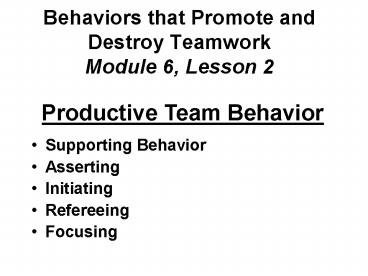Behaviors that Promote and Destroy Teamwork Module 6, Lesson 2 - PowerPoint PPT Presentation
1 / 12
Title:
Behaviors that Promote and Destroy Teamwork Module 6, Lesson 2
Description:
Behaviors that Promote and Destroy Teamwork Module 6, Lesson 2 Productive Team Behavior Supporting Behavior Asserting Initiating Refereeing Focusing – PowerPoint PPT presentation
Number of Views:82
Avg rating:3.0/5.0
Title: Behaviors that Promote and Destroy Teamwork Module 6, Lesson 2
1
Behaviors that Promote and Destroy
TeamworkModule 6, Lesson 2
Productive Team Behavior
- Supporting Behavior
- Asserting
- Initiating
- Refereeing
- Focusing
2
Supporting
Asserting
- Encouraging team members to express their ideas
- Making sure everyone gets a chance to be heard
- Be supportive of the persons right to speak by
listening and responding, even if you disagree
- Blowing the whistle when members are behaving
inappropriately - Gatekeeper - Avoid being aggressive, but dont allow put-downs
or monopolizing of the discussion
3
Initiating
Refereeing
- Speak up! Share ideas, even if you dont think
they amount to much. - Teams build on triggers or ideas that start
from one contribution.
- A third person can often help two people resolve
a conflict. - Sometimes a simple question will clarify the
controversial issues. - Sometimes called negotiation or mediation
4
Focusing
- Occasionally summarizing whats been said to help
the team stay on track. - Pointing out how far the team has come can help
the members see whats left to do.
5
Unproductive Behavior
- Squelching or Shutting Off
- Labeling
- Dominating
- Yes-Butting
- Naysaying
- Ignoring
6
Squelching
Labeling
- Interrupts, usually with an unrelated comment or
sarcastic remark - Member makes a suggestion and team ignores it as
though nothing had been said
- Tries to psychoanalyze the speaker
- Questions the speakers motive
- Example Youre just being paranoid or Youre
just trying to protect your job.
7
Dominating
Yes-Butting
- Does all the talking
- May think he/she is a leader, but actually is
just shutting off communication. - Makes members compete for a chance to speak.
- Really just a hypocrite
- Sends a double message
- Confusing and offensive
- Example Thats an excellent idea, but I dont
think we can use it.
8
Ignoring
Naysaying
- Express disinterest say nothing, doodle in their
notebooks, whisper to others while speaker is
speaking. - Just a warm body at the meeting
- Discourage team members by showing a lack of
interest.
- Disagrees, no matter what is said
- Pessimist
- Discourages ideas
- Gives members an excuse to do nothing.
9
How to Battle Unproductive Behavior
Squelching the Squelcher
- Move the discussion back quickly to what the
person was saying before the squelching - If Squelcher tries another attack, its time to
be assertive.
10
No Labeling Allowed
Dominating the Dominators
- Dominators may need to feel important or get
attention which may give them strong leadership
qualities. - Teach them to share limelight
- Pull other team members into discussion
- Stay professional, not personal
- Tell labeler that the team is examining what is
being said, not who is saying it. - Establish ground rules to prevent labelers from
having a chance.
11
No Buts about It
Just Say No to Naysaying
- Point out that the idea might not work or might
be a long shot (agree with the Naysayer briefly),
but that youll never know until you try - Suggest ways to improve the odds of success
- Get more information
- Anticipate problems
- Afraid of disagreements, conflict avoidant.
- Assure team that they are free to offer any ideas
they wish - Encourage trust and open communication.
12
Heat up the Warm Bodies
- Make them feel valuable to the team.
- Draw them out with whatever special talents of
skills they have. - Find a way to make them take an interest in what
the team is doing.































